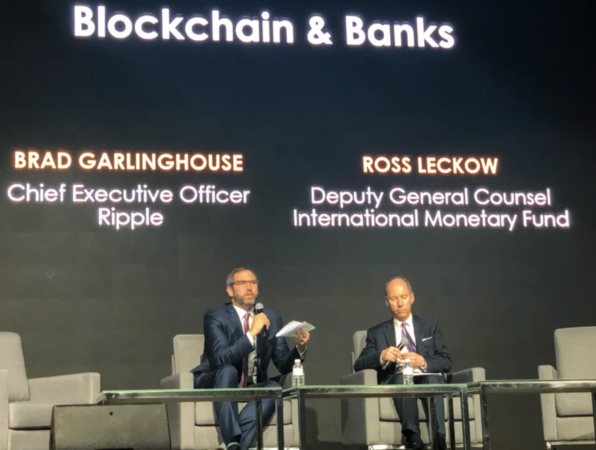Ripple's chief talks up the company's growth in Asia, challenging Swift, and unlocking 'the internet of value'

Ripple CEO Brad Garlinghouse has been busy the last couple of days talking up his company's alternative to the Swift banking network and the global opportunity for digital banking. In Singapore, Garlinghouse told Bloomberg News Ripple's solutions for moving money between financial institutions were making headway against the incumbent system.
"The technologies that banks use today that Swift developed decades ago really hasn’t evolved or kept up with the market,” Garlinghouse said. “Swift said not that long ago they didn’t see blockchain as a solution to correspondent banking. We’ve got well over 100 of their customers saying they disagree.” Those customers are on the firm's RippleNet, using it for at least some transactions. Metrics such as payment volumes and frequency of use weren't mentioned but Garlinghouse did make it clear that Ripple wasn't planning on a collaboration or joint venture with Swift.
Garlinghouse also had a chat with Ross Leckow, deputy general counsel of the International Monetary Fund, at the Singapore Fintech Festival. Leckow explained that while the IMF was interested in blockchain, it saw it as a piece of the larger fintech puzzle. Given the local audience, the conversation mainly touched on the area covered by the Association of Southeast Asian Nations, aka ASEAN.
Garlinghouse said growth in the region was being fostered by a positive regulation landscape. He cited Singapore, Thailand, and the Philippines as exemplars of how to move the technology forward. Thailand, in particular was lauded for legalizing a number of digital assets and providing blockchain companies clarity on how to operate legally. (Ripple's XRP is among those legalized assets).

Two things about the ASEAN region, specifically, were highlighted: (1) About half of Ripple's business is there and the company's Singapore HQ has seen business triple in the past year (2) $130B in remittances — payments to locals from abroad — come into the region annually.
Leckow continued: "Regulators have also been willing to work with the private sector in this region to put frameworks in place when they see a good example of how technology can help solve a real problem, to allow the use case to develop. Cross-border remittance is a good example of a use case that is very important here," he said.
Because it's so core to Ripple's business, Garlinghouse reiterated where he thinks the company can help: "We see a high degree of pain in cross-border payments in terms of how long it takes, how much it costs and the surprising lack of transparency in each transaction," he said.
There is also a whopping $10 trillion sitting and waiting in accounts to facilitate larger cross-border payments, Garlinghouse continued. Ripple's tech, he says, could allow that capital to stop being "parked" waiting for the payments to be made and instead be deployed elsewhere. He called for the development of "an Internet of Value .. where value moves like information does today. The introduction of the Internet in the ‘90s .. catalyzed opportunity for global commerce. [But] the seamless exchange of money around the world does not exist today. Close to 3 billion people are unbanked, and there is tremendous opportunity for us to bring [them] into the global economy. We must totally change the nature of how payments flow around the world. We must remove the friction." (Sources: Ripple, Bloomberg)



